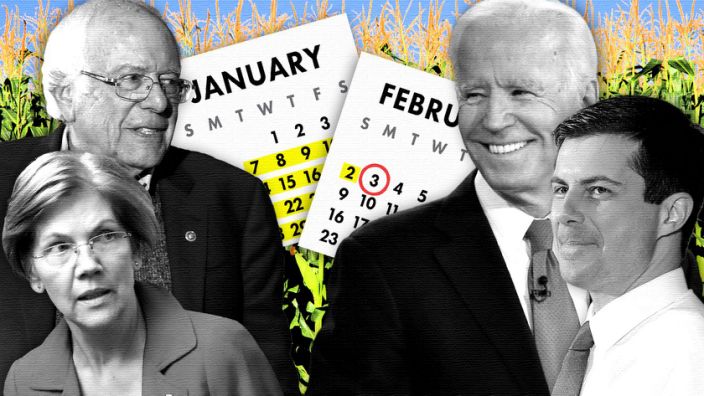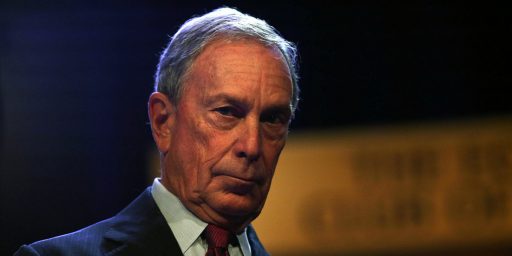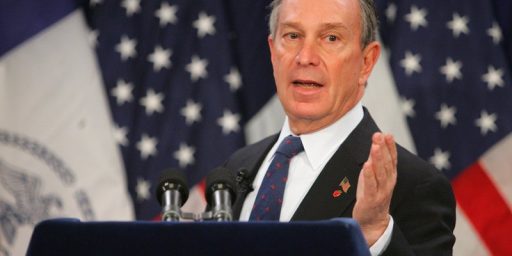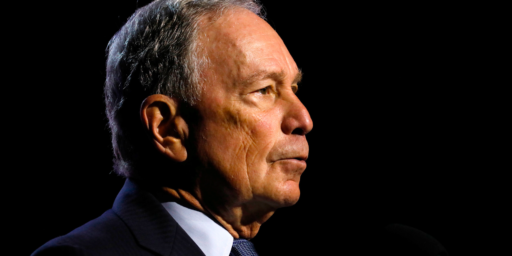DNC Making Up Rules as it Goes
Proposed mid-stream changes could help Bloomberg, hurt Sanders, and divide the party.

In 2016, the Democratic National Committee unnecessarily put its proverbial thumbs on the scale to help Hillary Clinton win the nomination, even though rival Bernie Sanders was never a serious threat. That created bitterness that persists to this day and may well have helped hand the election to Donald Trump, as Sanders supporters either sat it out or even crossed over. Clinton is still bitter over it.
This cycle, there are already charges that Chairman Tom Perez is stacking the convention with moderate members of the party establishment. Not surprisingly, Team Sanders is in a tizzy.
Meanwhile, there is talk afoot of changing the nominating rules mid-stream to favor establishment candidates.
A small group of Democratic National Committee members has privately begun gauging support for a plan to potentially weaken Bernie Sanders’ presidential campaign and head off a brokered convention.
In conversations on the sidelines of a DNC executive committee meeting and in telephone calls and texts in recent days, about a half-dozen members have discussed the possibility of a policy reversal to ensure that so-called superdelegates can vote on the first ballot at the party’s national convention. Such a move would increase the influence of DNC members, members of Congress and other top party officials, who now must wait until the second ballot to have their say if the convention is contested.
“I do believe we should re-open the rules. I hear it from others as well,” one DNC member said in a text message last week to William Owen, a DNC member from Tennessee who does not support re-opening the rules.
Owen, who declined to identify the member, said the member added in a text that “It would be hard though. We could force a meeting or on the floor.”Even proponents of the change acknowledge it is all but certain not to gain enough support to move past these initial conversations. But the talks reveal the extent of angst that many establishment Democrats are feeling on the eve of the Iowa caucuses.
Granting that this likely just amounts to idle chatter and is unlikely to happen, that it’s happening at all signals that the DNC learned nothing from the 2016 debacle. If you’re going to select your nominee through a series of primaries and caucuses, then the rules have to be transparent and static. And the party leaders have to bend over backward to demonstrate impartiality. Otherwise, the game looks rigged.
Similarly, by all appearances, the party is simply making up the rules on who gets to participate in the debates as it goes.
The Democratic National Committee is drastically revising its criteria to participate in primary debates after New Hampshire, doubling the polling threshold and eliminating the individual donor requirement, which could pave the way for former New York City Mayor Mike Bloomberg to make the stage beginning in mid-February.
Candidates will need to earn at least 10 percent in four polls released from Jan. 15 to Feb. 18, or 12 percent in two polls conducted in Nevada or South Carolina, in order to participate in the Feb. 19 debate in Las Vegas. Any candidate who earns at least one delegate to the national convention in either the Iowa caucuses or New Hampshire primary will also qualify for the Nevada debate.
The new criteria eliminate the individual-donor threshold, which was used for the first eight debates, including next week’s debate in New Hampshire. Bloomberg, the self-funding billionaire, has refused to take donations from other individuals, which has thus far precluded his participation in any of the debates since he joined the race late last year.
“Now that the grassroots support is actually captured in real voting, the criteria will no longer require a donor threshold,” said Adrienne Watson, a DNC spokeswoman. “The donor threshold was appropriate for the opening stages of the race, when candidates were building their organizations, and there were no metrics available outside of polling to distinguish those making progress from those who weren’t.”As of Friday, the three candidates who have met the Nevada polling thresholds are Joe Biden, Bernie Sanders and Elizabeth Warren, according to POLITICO’s tracking of public polling. The other candidates, including Bloomberg, have not yet cleared the polling threshold.
Four candidates who are slated to participate in next week’s debate — Pete Buttigieg, Amy Klobuchar, Andrew Yang and Tom Steyer — have also not yet hit the new polling threshold.[…]
Not everyone is thrilled that Bloomberg — who has hit 10 percent in only one of the requisite four polls released so far — could be on stage after the donor threshold was eliminated.
“To now change the rules in the middle of the game to accommodate Mike Bloomberg, who is trying to buy his way into the Democratic nomination, is wrong,” Jeff Weaver, a senior adviser to Sanders, told POLITICO as the rules were being announced.
Weaver pointed to other current and past candidates like Cory Booker, Yang and Julián Castro, who dropped off the stage because they couldn’t meet the minimum polling threshold.
“Now, suddenly because Mr. Bloomberg couldn’t satisfy one of the prongs, we see it get changed?” Weaver said. “That’s the definition of a rigged system where the rich can buy their way in.”
I’m more sympathetic to the party on this one, in that there were far too many candidates in the field and there has to be some way of deciding who gets on the debate stage. Public opinion polls are certainly a reasonable way of testing viability. Individual contributions always seemed an odd metric, in that it’s pretty easy to game, but it could theoretically be an indicator of intensity of support.
Regardless, while it makes perfect sense to ratchet the requirements up as the race goes along, those metrics should have been established at the outset. Otherwise, it appears that the party is crafting them to choose their preferred candidates—even if that’s not what’s actually happening.
Now, it’s true that the Republican Party looks to be changing the rules to ensure that President Trump faces no serious primary challenge. Indeed, it looks like a number of states may not have presidential primaries at all on the GOP side. But Trump would cruise to the nomination regardless and alienating the seven people who might cast a protest ballot for Bill Weld or Mark Stanford isn’t going to divide the party.
The Democratic Party is bigger and more diverse. Tensions between the progressive and establishment wings are going to leave a large swath of the party bitter regardless of the outcome. And Sanders is simply a sore loser; he’s going to feel robbed regardless if he loses. But it’s the job of the party leadership to minimize these challenges. Doing everything in their power to ensure that the process seems fair is a minimum first step in that.
UPDATE: The discussion below, and clarifications buried (appended?) late in the piece have persuaded me that the POLITICO report about “changing the nominating rules mid-stream to favor establishment candidates” is, at best, overblown. The rumblings of six anonymous people out of a large number of DNC members likely don’t amount to much—and the DNC Chairman is adamant that it won’t’ happen.
The overall concern expressed in the piece is nonetheless justified. While I both hope and expect that Democratic primary voters will choose someone other than Bernie Sanders, he and his supporters have a demonstrated a propensity for holding grudges over perceived sleights. It’s probably less of a concern with other candidates but changing the debate rules in such a way as to advantage latecomer Bloomberg and disadvantage Buttigieg and others could certainly backfire.




Their party, their rules. No set of debate rules would have satisfied everyone. If the rules allowed all who are announced, the top 5-6 candidates, who have demonstrated a following, would be upset that the chaff was still on the stage.
Bernie? F-him, he’s not a Democrat anyway.
I seem to recall both you and Steven arguing last time that of course the party is merely choosing their preferred candidate. That’s what they do, and how they do it is up to them. From the DNC point of view, there is no moral or ethical obligation to do that in any particular way — only a pragmatic need to pick the one most likely to win without damaging the brand.
I’m not sure how this hurts Sanders. It’s unlikely a significant number of Sanders voters are going to switch to Bloomberg. If anything, this helps Sanders, by further splitting the moderate vote.
The best analysis I’ve seen of the 2016 election is Identity Crisis by political scientist John Sides et al. Sides has a piece at Monkey Cage, Are Democrats really in disarray? Don’t underestimate their unity. The supposedly liberal MSM do love them their Dems in Disarray!! stories. As one of the commenters on Sides post notes, “The idea that there is disarray because we haven’t chosen the nominee before the first primary is ridiculous, and part of the problem.”
I love good, informative graphics, Sides has a couple. One shows net favorability of candidates among D primary voters and among all Americans. With Ds Bloomberg does better than only Gabbard and Trump. With all Americans, Bloomberg trails everybody. The other neatly summarizes favorability withing various 2016 voting groups, Obama-Clinton, Romney-Clinton, Obama-Trump, etc. For most of these groups Warren, Biden, and Sanders show pretty much tied favorability.
Meanwhile, as you note, James, the Rs are furiously, dare I say “rigging”, their primaries to support Trump, while the press barely take notice. Apparently that Republicans cheating doesn’t seem like news.
@Sleeping Dog:
@DrDaveT:
Sure. But the rules need to be set out in advance and transparent. Otherwise, they run the real risk of splintering the party and handing another election to Trump.
I’d vastly prefer a Biden, Buttigieg, or even a Bloomberg to Sanders. But, whoever they nominate needs to be able to rally, at a minimum, the people who voted for the losers. And that requires the losers believing they lost more-or-less fair and square.
“Dems in Disarray” is great clickbait. Excellent discussion of this over at LGM:
http://www.lawyersgunsmoneyblog.com/2020/02/there-will-not-be-a-dnc-conspiracy-against-bernie
More:
The net effect is ratfucking by media useful idiot.
@James Joyner:
Pink unicorns pooping candy would also be nice, but that is simply not possible for a portion of the Bernie cult no matter what.
From the article:
I find it interesting James that from that Politico article, you chose to highlight quotes from anonymous DNC members and Jeff Weaver (who never met anyone more demonic than a member of the DNC), while ignoring the DNC leaders who went on the record as opposing it.
I smell a hint of bias.
I think it is important to stress that the main rules that matter are the delegate allocation rules in the given states–which aren’t being altered. The media uses the word “rules” too loosely. Changing the debate rules after a certain point in this process does not strike me as a big deal as it becomes necessary to adjust to a shifting situation.
Now, tinkering with the superdelegate process does look more like changing something important mid-stream (and I would need to look at it more carefully to fully assess). Of course, in my opinion, the DNC should never have tinkered with those rules after 2016 just to place one losing candidate.
Indeed, all of this is because the DNC is weak and has limited control over whom the nominee will be.
(And while Brazille may have some dirt, I continue to balk at the notion the DNC rigged anything in regards to the 2016 nomination. Clinton won more votes and delegates. And Bernie’s continued feelings of not being fully welcome in the Democratic Party probably has something to do with him not actually being in the Democratic Party–I just find it tiresome).
@gVOR08:
The pres barely takes notice because it really is a non-story, the impeachment debacle showed quite clearly how all-in the preponderance of the GOP is on Trump and ‘Trumpism” (“Trumpism” is polite euphemism for authoritarianism).
@OzarkHillbilly:
You find it surprising that I highlighted the first dozen paragraphs of the report rather than the part tacked on to the end after publication?
@charon: I do actually think the preemptive rigging of the primaries to protect Trump is essentially a non-story. Unless he dies or resigns, he’s going to be the nominee. As much as I would vastly prefer Weld, he’s got no chance. So it makes zero sense for the party to allow another Pat Buchanan-style insurgent campaign to divide the party.
@Steven L. Taylor:
We’re fundamentally in agreement. Raising the debate bar progressively is reasonable and even necessary. There’s no reason, say, Tulsi Gabbard should be treated as a viable candidate at this point. I just think those bars should have been announced at the outset to have transparency. Choosing the limits in stride almost begs for calls of “you’re just trying to ensure my guy/gal doesn’t get a fair shake.”
@Steven L. Taylor:
As I note in the lede, it’s simultaneously true that DNC leaders, including Debbie Wasserman, were putting their thumbs on the scales to hurry along Clinton’s nomination and that she was absolutely going to cruise to the nomination regardless.
Yeah, stories like this always make me wonder who planted it, and why they are writing about it. How did the reporter find out? That’s a general question, not a specific one.
Last cycle, my social media was full of people I never heard of before hurling accusations right and left. Both pro-Bernie and anti-. Pro-Hillary, etc. The one common denominator was that they were stirring stuff up, and getting people mad at each other. So, who were these people? Is it possible they were running a desk in St. Petersburg? We now know that this is quite likely.
So, I try to give stories like this as little oxygen as possible.
@James Joyner:
Can you give a concrete example of an action DWS took in her role as head of the DNC that benefited Clinton to the detriment of Sanders? Because all I’ve ever seen is innuendo, and it’s really getting rather old.
@charon: I actively avoid seeing any sort of Democratic-infighting material. (Okay, except for James’s post here.) I will vote for whoever the D is, end of story.
@Han:
This is a four-year-old story to which I place not one but two links in the opening sentence of the post. It’s not in serious dispute. DWS was forced to resign from her post during the election campaign.
@reid:
I’m not even a Democrat and will do the same. At this point, I’d vote for Tulsi Gabbard. But a goodly 10 percent of peeved Sanders voters voted for Trump last time and another 10 percent stayed home or went third party. We don’t want a repeat of that. I don’t think that benefits anyone but Trump.
@James Joyner:
Dream on! Consider this:
https://twitter.com/NumbersMuncher/status/1224010076370980864
Found this over at BJ:
@James Joyner:
Yes, I read your links. Your first link is nothing but aspersions and innuendo. Nothing about concrete actions that put a thumb on the scale. Your second link to the Vox article seems to refute your premise. It points out Brazile walked back her assertions and stated there was no evidence of rigging, and that Sanders actually benefited from Clinton’s early inevitability status, so I’m not sure what you mean by not in serious dispute. Just because Clinton supporters don’t make a habit of arguing against beliefs people hold as an article of faith, doesn’t mean those beliefs aren’t disputed.
As for DWS, Yes she was forced to resign. Sometimes people are forced to resign for bad reasons, just ask Shirley Sherrod. There are a lot of reasons DWS should not be anywhere near the DNC, but putting a thumb on the scale for Clinton is not one of them.
@charon: Here’s the media doing a much better job with reporting something of real importance, namely, wealth inequality in this country…
@James Joyner:
Unfortunately, we will get this and worse no matter what happens. The Bernie Bro’s are indistinguishable from the most rabid Trumpers, and Bernie feeds them. Best that he goes away as early in the process as possible so as to minimize the damage. But damage there will be.
@James Joyner: Your first link is full of innuendo but nothing substantial and your second link outright disputes your assertions..
as the article says.
Did you read the article before posting it?
You’re right it’s not in serious dispute because it didn’t happen and all you have is innuendo. People are “forced to resign” all too often for things they didn’t do just because public perception has been distorted by the news media….
EDIT : If we take your statement and apply it to Trump then that means Trump is innocent of all wrong doing because he’s still in office blahblah..
@James Joyner:
You mean the part that refutes everything that came before it? YES!!!!
James, It’s called an “Update”. Instead of getting your nose out of joint you might try doing it. Lot’s of people would understand. Even me.
@James Joyner:
Are you seriously claiming that the inside baseball of how the DNC tweaks the rules for selecting a nominee could have a significant impact on whether Democrats will vote against Trump? If so, you need to change the name of your website.
@DrDaveT: Are BernieBros Democrats?
Will they feel welcomed into the party or will they feel kicked to the curb?
Are they interested in Bernie because he’s the best candidate by a tiny margin on a number of issues, or because he promises to shake up the system?
Its in Trump’s interest for them to feel aggrieved, so they won’t bother to vote for another bog-standard boring Democrat. It’s a fault line that Trump and his Russian friends worked hard to exploit in 2016, and were successful at. I would ask why these few mostly anonymous people are doing Trump’s work for him.
In the likely chance that Biden is the nominee, he’s going to have to put some effort into bringing the BernieBros on board, without alienating the moderates.
@DrDaveT:
It very well could if the affected candidates make a fuss about it, as Sanders did in 2016. It’s possible that Sanders and his supporters are sui generis, since they’re not at their core “Democrats.” But we also saw significant backlash from Clinton voters (the “PUMA” movement) in 2008 over perceived slights.
@OzarkHillbilly:
Fair enough—and I have indeed updated the post to clarify. But that was my response to an accusation of “bias” because I chose to highlight the main article and not some denials tacked on at the end that I hadn’t seen.
@James Joyner:
No, not so significant.
There was a lot of anger, with much greater justification for it than with the Berniebros.
But it was mostly bark, in the event, in November, not much bite.
@charon: It got to be a thing for awhile in 2008 that reporters would seek out Clinton supporters with the conversation almost always going:
Are you pissed Hillary lost? Oh yeah, I’m real angry.
Will you vote for Obama anyway? Vote? I’ll donate money to him, I’ll canvas for him, I’d crawl over broken glass to vote for him.
But the supposedly liberal MSM love their Dems-in-dissarray stories, so they kept asking, and getting the same answers.
@James Joyner:
That was then; this is now. That was before the GOP completed a hostile takeover of democracy and declared the moral equivalent of martial law. I find it inconceivable that anyone motivated by the concerns that motivate BernieBros, or any other left-of-Attila voting bloc, will not vote against Trump en masse regardless of which of the remaining candidates the Democrats eventually nominate. In 2016, it was possible to self-delude regarding how bad Trump would really be.
It would be nice if you are right. Here is some evidence you are not:
https://twitter.com/NumbersMuncher/status/1224010076370980864
@charon:
As noted in the “trolley problem” subthread in the open forum, what people say they would do is not the same as what they actually would do.
Then again, we’ve already seen that American voters are totally irrational, so my intuitions are probably not worth spit.